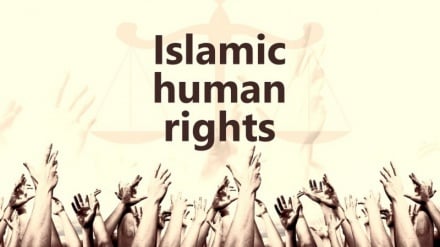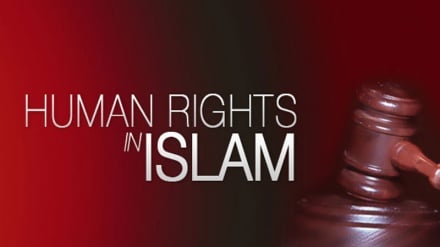Islamic Human Rights (24)
Welcome to the 24th weekly episode of the series Islamic Human Rights. In this episode, we study the topic of freedom in the viewpoint of divine religion of Islam and the West.
Freedom is one of the praiseworthy human values. As the result of freedom, ideas and thoughts grow and talents thrive and flourish. Thus, many schools of thought and thinkers have expressed their standpoints on this topic of importance. Today, Western regimes claim to defend freedom. The Western regimes’ ringleaders and Western thinkers believe that social and personal freedoms were initially presented in Europe. Western philosophers, for the first time, expressed their opinions on the topic of freedom in 18th Century AD. The majority of these opinions and principles have been stated in the Universal Declaration of Human Rights.
However, it should be said that many centuries prior to consideration of freedom as one of major human rights by European thinkers, intellectuals, and leaders, this topic of importance was detailed in heavenly books. It is interesting to note that the concept of freedom which was presented in France in late 18th Century and later on in the Western world, maintained a more limited meaning and definition than the meaning of freedom in divine schools of thought.
Freedom was one of the first demands of heavenly and divine religions for mankind and the divine prophets were the first messengers of freedom for man. In fact, all prophets called on people to comply with the one and only creator of the world, God Almighty, and to refuse to abide by anyone other than God.
The 36th ayah of Surat al-Nahl in Holy Quran notes: Certainly We raised an apostle in every nation to preach: ‘Worship Allah, and keep away from the Rebels.’
On this basis, Prophet Moses, in the beginning of his uprising, urged people to believe in monotheism. He also called for people’s freedom. This message was not conveyed for the sake of liberation of Egypt and its economic sources. In fact, it intended to liberate the people of Egypt from the yoke of oppressors. Obviously, if the people of a region are liberated, their land and economic sources will also be liberated.
According to the 18th ayah of Surat al-Dukhan in Holy Quran, the message of Prophet Moses was: ‘Give over the servants of Allah to me; indeed I am a trusted apostle sent to you…’
The response of Pharaoh and his cohorts was that ‘we don’t submit to those, who are our servants.’
Pharaoh claimed that: ‘I am your superior god.’
However, his intention behind making such claims was to state that he handles people’s affairs and he should set rules and regulations for organization of people’s lives.
Pharaoh and his followers were idolaters and considered themselves to be servants of idols.
Hence the elite of Pharaoh’s people said, ‘Will you leave Moses and his people to cause corruption in the land, and to abandon you and your gods?’
Thus, Moses stood firm against Pharaoh’s claim and demanded the liberation of people from this servitude.
In fact, Moses pointed out that mankind should only abide by God Almighty, and should not follow man-made rules and instructions.
In Islamic culture, freedom is rooted in monotheism. Therefore, according to different Surahs of Holy Quran, prophets in their invitations called on people to worship God. Meanwhile, monotheistic ideology urges mankind to only be the servitude of God and not to comply with anyone other than God, whether it is Pharaoh, or an establishment or a system.
The 64th ayah of Surat Al-I’Imran in Holy Quran notes: Say, ‘O People of the Book! Come to a word common between us and you: that we will worship no one but Allah, and that we will not ascribe any partner to Him, and that we will not take each other as lords besides Allah.’
This fact has existed in Judaism and Christianity and all of the divine religions. The sacred religion of Islam which is the flag-bearer of monotheism emphasizes mankind should only be the servant of God Almighty.
The sacred religion of Islam values and treasures humans and notes that mankind is only the servitude of God. Freedom in Islam is tantamount to liberation of mankind from the servitude of anyone other than God.
In Islamic viewpoint, freedom is a divine blessing via which man finds his path to prosperity. Islam is the messenger of freedom because it has left mankind free to choose his path to growth and development. Hence, freedom in Islam is not equal to allowing mankind to neglect all commitments. For mankind to cover the path to growth and perfection, it would be impossible for him to reject all boundaries and restrictions. Mankind maintains a number of God-given talents which should emerge and thrive. Other human beings should not obstruct the emergence of these talents. So, freedom is equivalent to liberation from the yoke of impediments and hurdles.
In the view of Islam; color, race, gender, and other apparent differences, do not lead to superiority of any individual to others, because this divine religion notes that all human beings are born free.
Now that we have come to realize the importance of freedom in monotheistic religions, we should study the differences of the viewpoints of Islam and the West toward the topic of freedom.
Islamic freedom and Western freedom maintain different origins and outcomes, both. In the West, freedom is rooted in the demands and carnal desires of mankind. In fact, the philosophy behind freedom in the West is based on humanism, in which human desires determine the freedom of mankind. In this standpoint, humans should be free to do whatever they want. Such definition of freedom is not practical in any community.
If one assumes that man is free to do whatever he wants, this will naturally confine the freedom of many others and will deny them comfort, security, and peace of mind. Even the anarchists who emerged in Europe in 19th and 20th Centuries, believed in a number of restrictions and boundaries.
MR/MG


